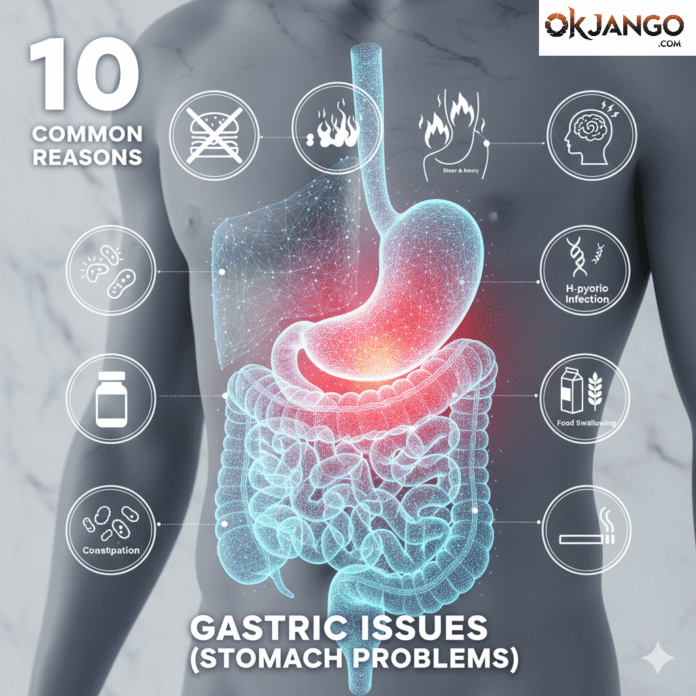Gastric issues (digestive problems) can stem from a wide variety of causes, ranging from lifestyle factors to underlying medical conditions.
10 Common Reasons for Gastric Issues (Stomach Problems)
| Common Gastric Issue/Cause | Description and Main Mechanism |
| Poor Diet & Eating Habits | Eating large, fatty, or spicy meals; eating too quickly; or consuming excessive caffeine/alcohol. |
| Chronic Stress & Anxiety | The gut-brain axis is highly sensitive to stress, which can slow digestion, trigger spasms, and increase acid production. |
| Heartburn (GERD/Reflux) | Stomach acid flowing backward into the esophagus due to a weakened lower esophageal sphincter (LES). |
| Infection (e.g., H. pylori) | A bacterial infection that irritates the stomach lining, commonly leading to peptic ulcers and chronic gastritis. |
| Excess Air Swallowing (Aerophagia) | Caused by chewing gum, drinking carbonated beverages, smoking, or eating/drinking too fast, leading to belching and bloating. |
| Food Intolerances | Difficulty digesting specific components of food, such as lactose (dairy sugar) or gluten, leading to gas, bloating, and diarrhea. |
| Medication Use (NSAIDs) | Regular use of Nonsteroidal Anti-inflammatory Drugs (NSAIDs) like ibuprofen or aspirin, which can damage the stomach lining. |
| Dysbiosis (Imbalanced Gut Flora) | An unhealthy ratio of “good” vs. “bad” bacteria in the gut, impairing digestion and causing gas, bloating, and bowel changes. |
| Constipation | Infrequent bowel movements and hard stools, causing abdominal pain, bloating, and feelings of fullness. |
| Smoking | Nicotine can relax the lower esophageal sphincter (making reflux worse) and increase the risk of ulcers and other digestive diseases. |
🚨 When to See a Doctor Immediately
Consult a healthcare professional right away if you experience any of the following:
- Severe or persistent abdominal pain
- Difficulty swallowing
- Bloody or black, tarry stools
- Bloody or black vomit
- Unexplained weight loss
- Persistent diarrhea or vomiting
Frequently Asked Questions (FAQ)
What are the earliest signs of a stomach issue?
The earliest and most common signs of a developing stomach issue are often persistent bloating, frequent heartburn (acid reflux), and a feeling of fullness shortly after starting a meal (early satiety). Other initial symptoms include chronic belching, flatulence, and mild, recurring abdominal discomfort that seems unrelated to a specific meal.
Can stress really cause stomach ulcers or gut pain?
Yes, stress can significantly worsen or even trigger gastric issues, though it rarely causes ulcers directly. Chronic stress and anxiety primarily impact the gut-brain axis, leading to:
- Increased sensitivity to pain in the gut (visceral hypersensitivity).
- Increased stomach acid production, which irritates the lining.
- Reduced blood flow to the stomach, hindering its natural repair process.
- Altered gut motility (the movement of food), causing diarrhea or constipation.
What is the difference between acid reflux, GERD, and heartburn?
Heartburn is the symptom—the burning sensation in the chest and throat caused by stomach acid.
Acid Reflux is the event—the backward flow of stomach acid into the esophagus. It happens to everyone occasionally.
Heartburn is the symptom—the burning sensation in the chest and throat caused by stomach acid.
How long do common gastric issues typically last?
The duration depends entirely on the cause:
- Chronic Issues (GERD, IBS, Gastritis): These are long-term conditions that require ongoing management through diet, medication, and stress reduction. Symptoms can last weeks, months, or years without treatment.
- Acute Indigestion/Bloating: Usually resolves within a few hours or a day with over-the-counter antacids or lifestyle changes.
- Viral Gastroenteritis (“Stomach Flu”): Typically lasts 1 to 3 days.
What are NSAIDs and why do they cause stomach problems?
The duration depends entirely on the cause:
NSAIDs are Non-Steroidal Anti-inflammatory Drugs, such as ibuprofen (Advil) and aspirin. They cause stomach problems by blocking the body’s production of prostaglandins, which are chemical compounds that protect the stomach lining by promoting mucus and bicarbonate secretion. When you block these protective prostaglandins, the stomach’s inner lining becomes vulnerable to its own corrosive acid, leading to gastritis or peptic ulcers.
What foods are the biggest culprits for causing indigestion?
The most common food triggers for indigestion (dyspepsia) are those that take longer to digest or increase stomach acid production:
- Caffeine and Alcohol: Both can relax the Lower Esophageal Sphincter (LES), increasing reflux, and stimulate acid production.
- High-Fat and Fried Foods: They slow down stomach emptying.
- Spicy Foods: Can irritate the stomach lining.
- Acidic Foods: Citrus fruits (oranges, lemons) and tomato-based products.
Is indigestion the same thing as heartburn?
No, they are related but distinct. Indigestion (Dyspepsia) is a general term for discomfort in the upper abdomen, including bloating, burping, and feeling full too soon. Heartburn is a symptom of acid reflux—a burning pain in the chest specifically caused by acid backing up into the esophagus. You can have indigestion without heartburn, and vice versa.
When should I worry about indigestion and see a doctor?
While most cases of indigestion are minor, you should see a doctor immediately if you experience “alarm symptoms,” which can indicate a more serious underlying condition:
- Indigestion that lasts longer than two weeks.
- Unintentional weight loss or loss of appetite.
- Difficulty swallowing (dysphagia).
- Black, tarry stools or blood in vomit.
- Severe, persistent, or radiating pain (e.g., pain spreading to the jaw, neck, or arm).
Can simply eating too fast cause indigestion?
Yes, eating too fast is a very common cause. When you eat quickly, you tend to swallow more air (aerophagia), which leads to gas and bloating. Additionally, eating quickly prevents your body from properly signaling to the digestive tract that food is coming, disrupting the synchronized release of digestive enzymes and bile needed to break down the meal effectively.
How can probiotics help with chronic indigestion?
Probiotics are “good bacteria” that help manage indigestion symptoms, particularly those related to a bacterial imbalance (dysbiosis) or Irritable Bowel Syndrome (IBS). They work by:
- Improving the speed of food movement through the gut (motility).
- Producing helpful short-chain fatty acids (SCFAs).
- Reducing gas production by out-competing gas-producing bacteria.
However, probiotics are not a cure for all types of indigestion, especially those caused by GERD or ulcers.
Disclaimer: The following information is for educational purposes only and should not be considered medical advice. If you have persistent or severe gastric issues, please consult a healthcare professional.
Read more blogs at : Okjango.com


